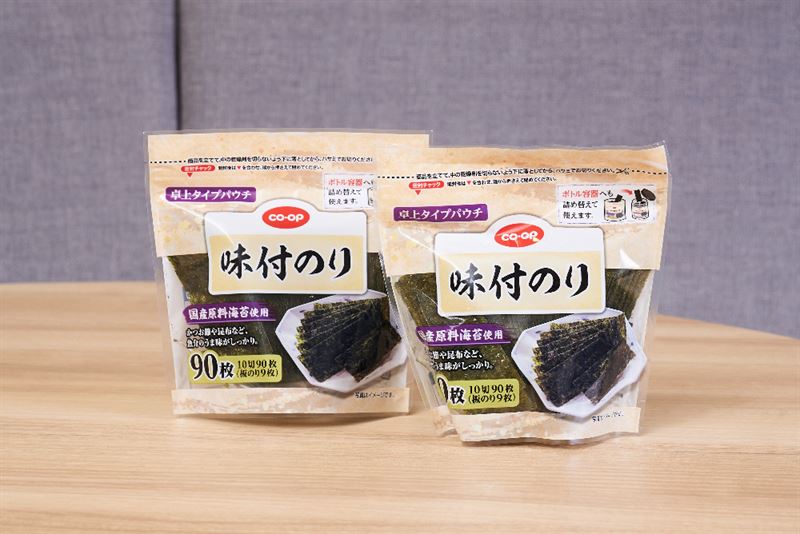
- Cooperation enables seaweed snack packaging made with renewable raw materials, further applications planned
- First packaging made with renewable plastics via mass balancing that has received the Japanese Eco Mark certification
Neste, Mitsui Chemicals and Prime Polymer, a subsidiary of Mitsui Chemicals, are working together to provide more sustainable food packaging solutions for CO-OP, a brand of the Japanese Consumers Co-operative Union (JCCU). In the first phase of the collaboration, bio-based raw materials will replace fossil ones in the production of the packaging material for a seaweed snack. Going forward, the companies intend to introduce bio-based raw materials also to packaging for further products.
“Change begins with small things. In this case, it’s slices of dried seaweed,” says Lilyana Budyanto, Head of Sustainable Partnerships APAC at Neste’s Renewable Polymers and Chemicals business unit. “However, the impact of renewable plastics packaging isn’t small at all. It’s a crucial contributor to the sustainability transformation of the plastics industry and reducing emissions along the value chain. We are looking forward to the cooperation with Mitsui Chemicals, Prime Polymer and JCCU evolving.”
Neste provides renewable Neste RE™, a feedstock for polymers that is made entirely from bio-based raw materials. Through Mitsui Chemicals and the company’s subsidiary Prime Polymer, the feedstock is processed into renewable polypropylene under the brand name Prasus™, which is then turned into food packaging for JCCU. The packaging made with renewable materials comes with the same quality and performance as previously, when it was produced from fossil feedstock. The sole differences lie in the reduced carbon footprint of the packaging and the replacement of fossil materials during its production. A mass balancing approach is applied to allocate the renewable material to the plastic packaging. The seaweed snack packaging is the first packaging made with renewable plastics via mass balancing that has received the Japanese Eco Mark certification.
About Neste
Neste (NESTE, Nasdaq Helsinki) creates solutions for combating climate change and accelerating a shift to a circular economy. The company refines waste, residues and innovative raw materials into renewable fuels and sustainable feedstock for plastics and other materials.
As the world’s leading producer of sustainable aviation fuel and renewable diesel and a forerunner in developing renewable and circular feedstock solutions for polymers and chemicals, Neste helps its customers to reduce their greenhouse gas emissions by at least 20 million tons annually by 2030.
The company’s ambition is to make the Porvoo oil refinery in Finland the most sustainable refinery in Europe by 2030. Neste is committed to reaching carbon-neutral production by 2035, and will reduce the carbon emission intensity of sold products by 50% by 2040. Neste has also set high standards for biodiversity, human rights and the supply chain. The company has consistently been included in the Dow Jones Sustainability Indices and the Global 100 list of the world’s most sustainable companies. In 2022, Neste’s revenue stood at EUR 25.7 billion.
About Mitsui Chemicals
Mitsui Chemicals’ roots can be traced back to 1912 when it began producing raw material for chemical fertilizers from coal gas byproducts, the first company in Japan to do so. This undertaking significantly contributed to increasing agricultural productivity, a major social issue at the time. Later, the company evolved its technology from coal chemicals to gas chemicals, and in 1958 it built Japan’s first petrochemical complex and so provided impetus to Japan’s industry. Today, the company boasts many world-class products and with over 160 companies in 30 countries. Its business portfolio includes Life&Healthcare Solutions, Mobility Solutions, ICT Solutions, Basic & Green Materials. Mitsui Chemicals will continue to contribute to solving social challenges with its state-of-the-art technology and by “Creating New Customer Value through Innovation”.
About Prime Polymer
Prime Polymer Co., Ltd. was established in April 2005 as part of a comprehensive tie-up with Mitsui Chemicals, Inc. and Idemitsu Kosan Co., Ltd. Our global polyolefin business activities for research, production and marketing have been completely integrated to maximize strong points and expand operations. We can offer you superior and reliable products, technologies and services to be your Prime Solution Partner. We share the goals of our customers and have the proven experience and ability to provide them with the best solutions for maximum results. We aim to be Prime in everything we do.
Source
Neste, press release, 2023-11-17.
Supplier
Japanese Consumers Co-operative Union (JCCU)
Mitsui Chemicals
Neste Corporation
Prime Polymer Co., Ltd.
Share
Renewable Carbon News – Daily Newsletter
Subscribe to our daily email newsletter – the world's leading newsletter on renewable materials and chemicals









